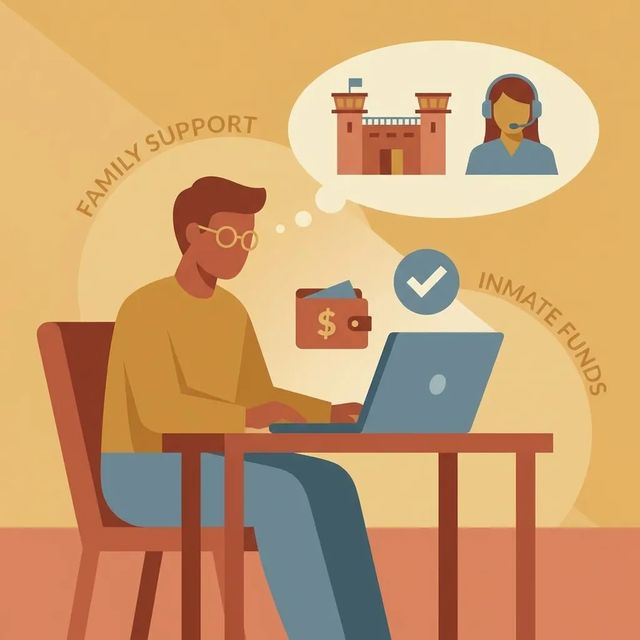FCI Coleman Low, FL
Explore
Find an Inmate at FCI Coleman Low, FL
Search for a loved one and send messages and photos in minutes.

Guides for This Facility

How to Contact an Inmate at Facility
Phone calls are the primary way to stay in touch with someone at FCI Coleman Low, but they come with strict rules and time limits. Here's what to expect and what to double-check before you count on a specific setup.
Read Guide
How to Send Money to Facility
Sending money helps your loved one buy basics and approved extras through commissary. Here's the MoneyGram information you need to get right for a Federal Bureau of Prisons (BOP) commissary deposit.
Read Guide
How to Get Approved to Visit Someone at USP Coleman 1
Getting approved to visit at USP Coleman 1 starts well before you show up at the front desk. The person you're visiting needs to add you to their visiting list, and the Bureau of Prisons (BOP) must clear you before you can be admitted.
Read GuideAt a Glance
Visitation
- Call FCI Coleman Low at 603-342-4000 to confirm the current visiting schedule before you travel.
- The facility’s Institution Supplement must include the visiting schedule, procedures for special visitors, approved dress code, and ID requirements.
- The Warden must provide visiting hours on Saturdays, Sundays, and holidays and is encouraged to offer evening hours when resources allow.
Communication
- Inmate phone calls are made through the inmate telephone system (ITS) and are subject to monitoring under BOP rules.
- The facility page lists 603-342-4000 as a contact number to confirm schedules and on-site details.
- Inmates must place personal calls through ITS and may not use call forwarding or toll‑free/credit‑card call numbers.
Sending Money
- MoneyGram deposits to BOP commissary accounts require the inmate’s eight‑digit register number immediately followed by the inmate’s last name and Receive Code 7932.
- FCI Coleman Low maintains a commissary account that inmates use to purchase items not regularly issued by the institution.
- The Bureau of Prisons uses specific Trust Fund forms including BP‑A1054 (TRULINCS Contact Request) and BP‑199 (Request for Withdrawal of Inmate’s Personal Funds).
Based on official sources and community feedback. Learn how we verify
Topic Overviews
Visitation
FCI Coleman Low publishes an Institution Supplement covering the visiting schedule, special visitor procedures, the approved dress code, and ID requirements. The Warden sets visiting hours, which must include Saturdays, Sundays, and holidays (evening hours are encouraged when resources allow). Each inmate gets at least four hours of visiting time per month. Call 603-342-4000 to confirm the current schedule before you make the trip. You'll need to be on the inmate's approved visitor list. That means completing a visitor application, submitting it as instructed, and waiting for approval. Some facilities also offer video visitation or other remote options, so check the supplement or ask staff when you call.
Read full guideCommunication
Staying in touch with someone at FCI Coleman Low means working through Bureau of Prisons systems. Inmates place outgoing calls using the inmate telephone system (ITS), and those calls are monitored. Personal calls must go through ITS. Inmates cannot use call forwarding, toll-free numbers, or credit-card call numbers. Unmonitored attorney calls may be allowed under certain circumstances per BOP guidance. For the most current schedules and on-site details, call 603-342-4000. Electronic communication options can vary by site and vendor, but common ones include vendor email or tablet services, TRULINCS text messaging, and remote video visits. TRULINCS messages are text-only (no attachments), capped at about 13,000 characters, and screened for security before delivery.
Read full guideSending Money
Family and friends can deposit money into an inmate's commissary account at FCI Coleman Low. Inmates use these funds to buy personal items not regularly issued by the institution. Deposit options typically include an online portal, a lobby kiosk, a phone service, or mailing a money order, though exact methods and fees depend on the vendor and what the facility accepts. Before sending anything, gather the inmate's full name and register (or booking) number, and fill out every deposit field carefully so the payment posts correctly. For MoneyGram deposits to a Bureau of Prisons commissary account, enter the inmate's eight-digit register number immediately followed by their last name, and use Receive Code 7932. The BOP also uses Trust Fund forms such as BP-A1054 (TRULINCS Contact Request) and BP-199 (Request for Withdrawal of Inmate's Personal Funds).
Read full guideCommon Questions
Showing 6 of 9How do I confirm visiting hours at FCI Coleman Low?
Call FCI Coleman Low at 603-342-4000 to confirm the current visiting schedule before you travel. You can also check the Institution Supplement for the official visiting days, hours, and any special procedures.
VisitationWhat steps are generally required to get approved to visit someone at FCI Coleman Low?
Start by asking the inmate to add you to their approved visitor list. Then complete the required visitor application, submit it the way the facility instructs, and wait for official approval before you travel.
VisitationHow much visiting time is an inmate entitled to each month at this facility?
Each inmate is entitled to a minimum of four hours of visiting time per month.
VisitationCan inmates at FCI Coleman Low make phone calls and are those calls monitored?
Yes. Inmates place outgoing calls through the Bureau of Prisons inmate telephone system, and those calls are subject to monitoring. Unmonitored attorney calls are permitted in certain circumstances under BOP guidance.
CommunicationWhat number should I call to confirm schedules or on-site details for FCI Coleman Low?
Call 603-342-4000 to confirm schedules and on-site details for FCI Coleman Low.
CommunicationAre TRULINCS messages to inmates limited in size or attachments at FCI Coleman Low?
Yes. TRULINCS-style messages are text-only, have no attachments, and are limited to about 13,000 characters. All electronic messages are screened for security before delivery.
CommunicationMore Guides
Ready to Connect?
Search for your loved one to start communicating today
Did You Know?
FCI Coleman Low is a federal correctional institution in Florida. Staying connected with someone inside matters. Regular visits and communication help maintain bonds that make a real difference, both now and after release.
This guide is based on feedback from 126 families and official facility documentation. Learn how we verify
